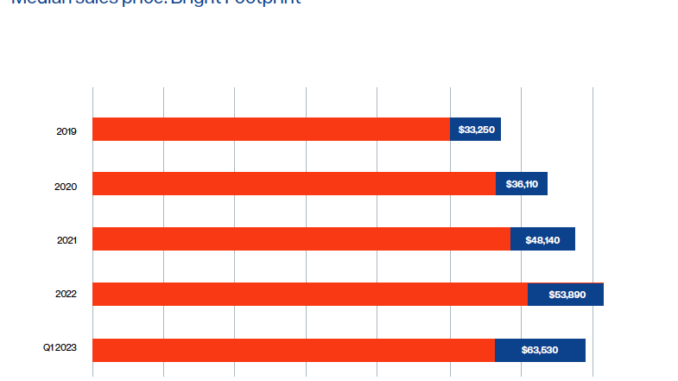
With the latest industry turmoil around compensation, steering and more due to lawsuits and the investigation by the Department of Justice, those outside the housing industry would assume the benefit to listing a home on the MLS would be negligible. They would be wrong.
The MLS is crucial for home sellers, even in a strong seller’s market, as it provides significant financial benefits and access to more potential buyers, according to a recent study by Bright MLS called “On-MLS Study: Measuring the Benefits of an Open and Transparent Housing Marketplace.”
Bright MLS collaborated with Drexel University to analyze the role the MLS plays in the home sale transaction, and specifically to measure the seller benefits associated with listing and marketing a home on the MLS. This study compared on- and off-MLS home sales, analyzing more than 1 million transactions that took place on Bright MLS between 2019 and the first quarter of 2023.
In a “Real Estate Insiders” podcast with James Dwiggins, Chief Economist for BrightMLS Lisa Sturtevant addressed the question, “What do you have to say to those who comment, ‘Shocker, an MLS has a survey that is positive about MLSs?”
“I’m really interested in answering questions where I’m not trying to [have a] “gotcha” moment. Instead, does something logically make sense to me? Before we get to the math, statistics or data, does it make sense that the more eyeballs you have on a property when it’s available to a broader number of people [would create] more demand, and then that would then generate the best offer?” says Sturtevant. “It’s Econ 101. If supply stays the same, which it is, then demand would go up because of more eyeballs and that should put upward pressure on price.”
Once she determined that is was a logical assumption, Sturtevant looked at the study Bright MLS had done on the subject years ago. “[That study] just showed the averages off-MLS versus the averages on-MLS.” She noted that it didn’t tell the whole picture, because maybe the properties off the MLS were difficult to market, so she looked for a true “apples to apples” comparison in the recent survey. She, instead, decided to take a deep dive into public records data compared to Bright MLS data.
Here’s what the study found:
Homes sell for more on the MLS vs. off, says study
Homes sell for more when they are listed on the MLS. This research examined comparable homes sold on- and off-MLS and found that homes listed and marketed on the MLS consistently bring sellers a higher price. Between 2019 and the first quarter of 2023, homes sold on the MLS sold for 17.5% more than comparable homes sold without being listed on the MLS.
Furthermore, according to the research, the on-MLS price premium has increased in recent years. In 2019, on-MLS sales commanded a 13.3% higher price, on average. By 2022, the typical on-MLS sale price was 18.3% higher, and data from the first quarter of 2023 suggests the on-MLS price premium is even more pronounced this year. The on-MLS increase based is on the 2023 average sale price of homes marketed through Bright MLS compared to other similar homes in the same area.
Study shows financial benefits for listing on the MLS
The research also shows that there is a significant financial benefit to sellers who market their home on Bright MLS.
Homes that are listed on the MLS — as opposed to homes sold privately by the seller, offered as a broker’s office exclusive, or otherwise sold without listing on the MLS — reach the greatest number of prospective homebuyers and bring the seller the most competitive offer. In 2022, this research indicates that listing a home on the MLS brought the typical home seller an additional $53,890 compared to what they would have received if they had sold their home outside of the MLS.
Some other takeaways:
84.0% of all homes sold across the Bright MLS footprint were listed on the MLS from 2019 to Q1-2023.
Regression results show a 17.5% price benefit for homes listed on the MLS compared to off-MLS sales.
The Philadelphia metro area had an on-MLS premium of 15.5%, while Baltimore and Washington, D.C. had premiums of 15.8% and 17.0% respectively.
Listing on the MLS resulted in a financial benefit of nearly $54,000 for sellers in the Bright footprint in 2022.
Sellers in the Philadelphia metro area made $53,110 more, Baltimore metro area sellers made $52,480 more, and Washington, D.C. metro area sellers made $61,170 more when listing on the MLS in 2022.
Methodology: This research analyzed more than 1 million home sales transactions taking place in five states and the District of Columbia between 2019 and the first quarter of 2023. This analysis makes use of public records data, which are local government data that include information about all home sales transactions in the local jurisdiction.
The transactions in the public records data are compared to Bright MLS listing data, the comprehensive database of properties listed for sale by participating agents and brokers in the region.
A critical element of the research was to identify true “arm’s-length” residential resale home sales transactions in order to estimate outcomes for a typical seller in the market. An arm’s-length transaction is one in which the buyer and seller act independently and do not have any relationship to each other. As a result, each party consummates the transaction only if they perceive it to be in their own self-interest.
There is no specific identifier of an arm’s-length transaction in either the public records or MLS data; however, the data used in this study include a range of information that was used to define traditional arm’s-length transactions as carefully as possible. Several other types of homes were excluded from this analysis to narrow the focus to traditional home sales and to make it possible to compare on- and off-MLS transactions.



